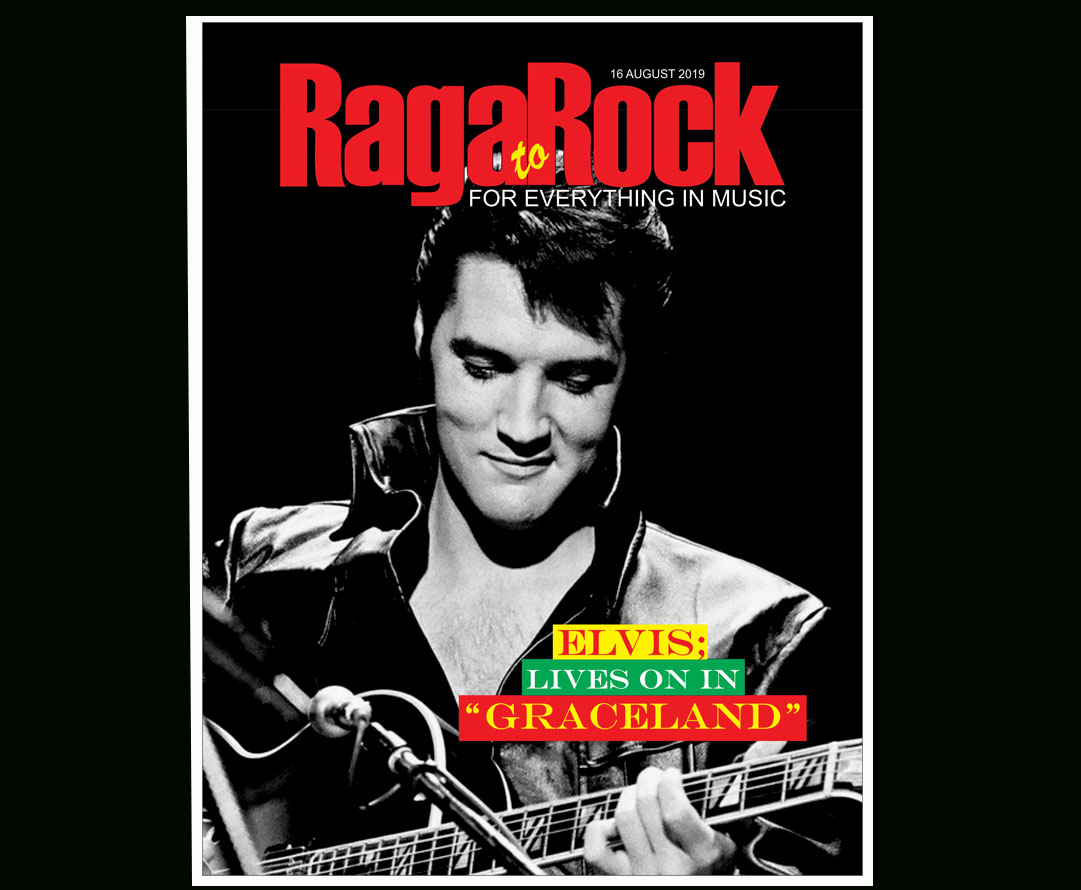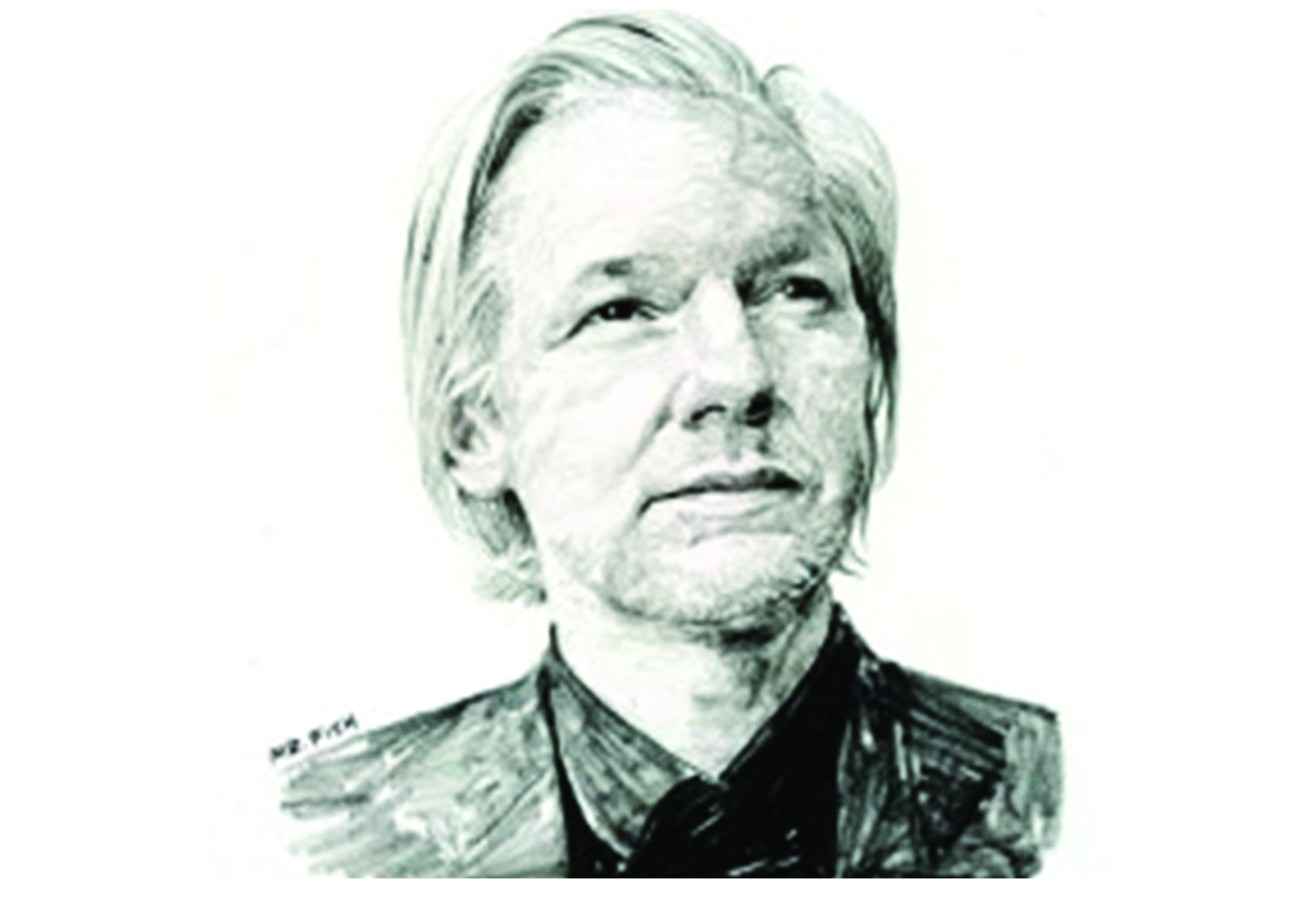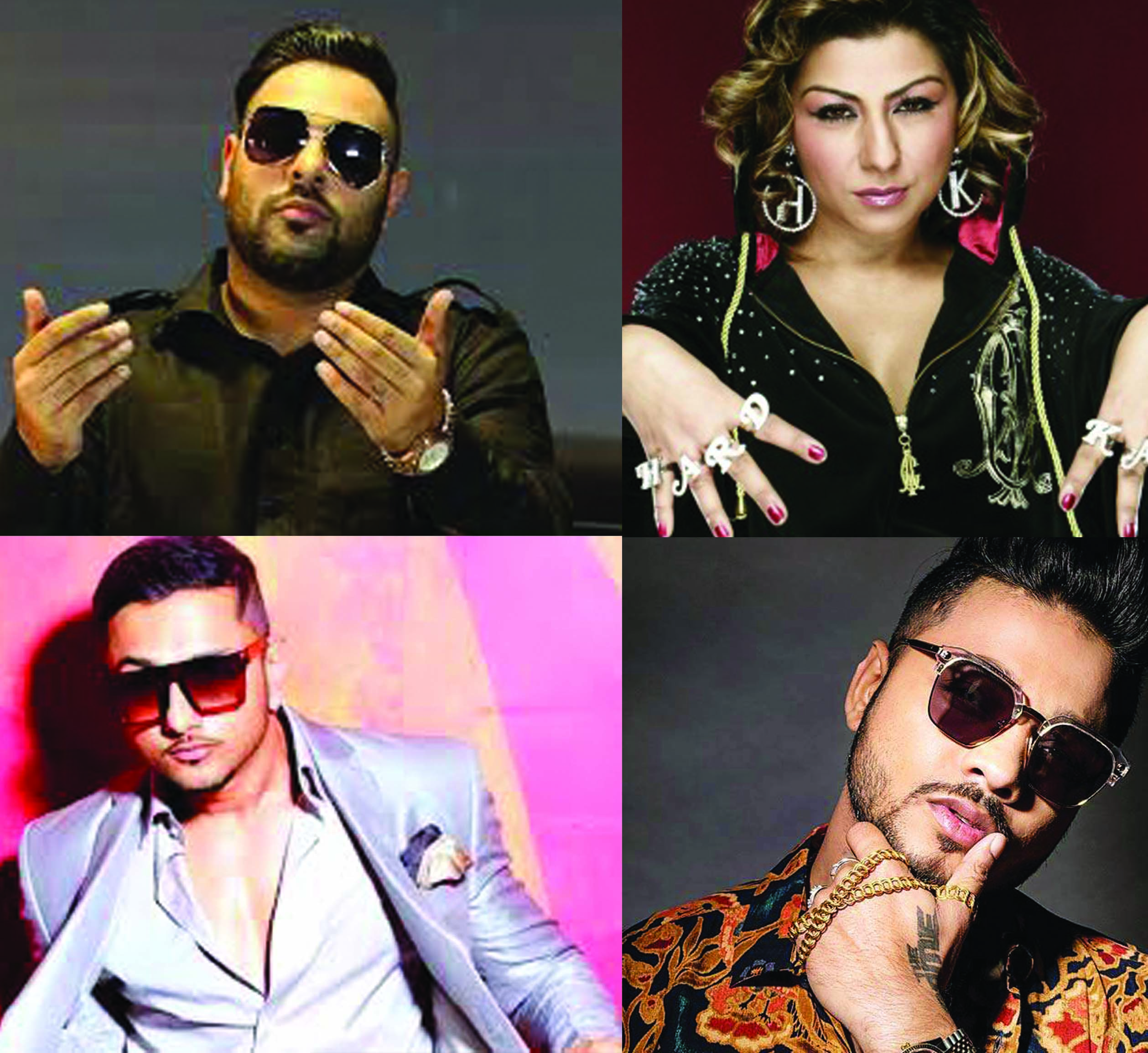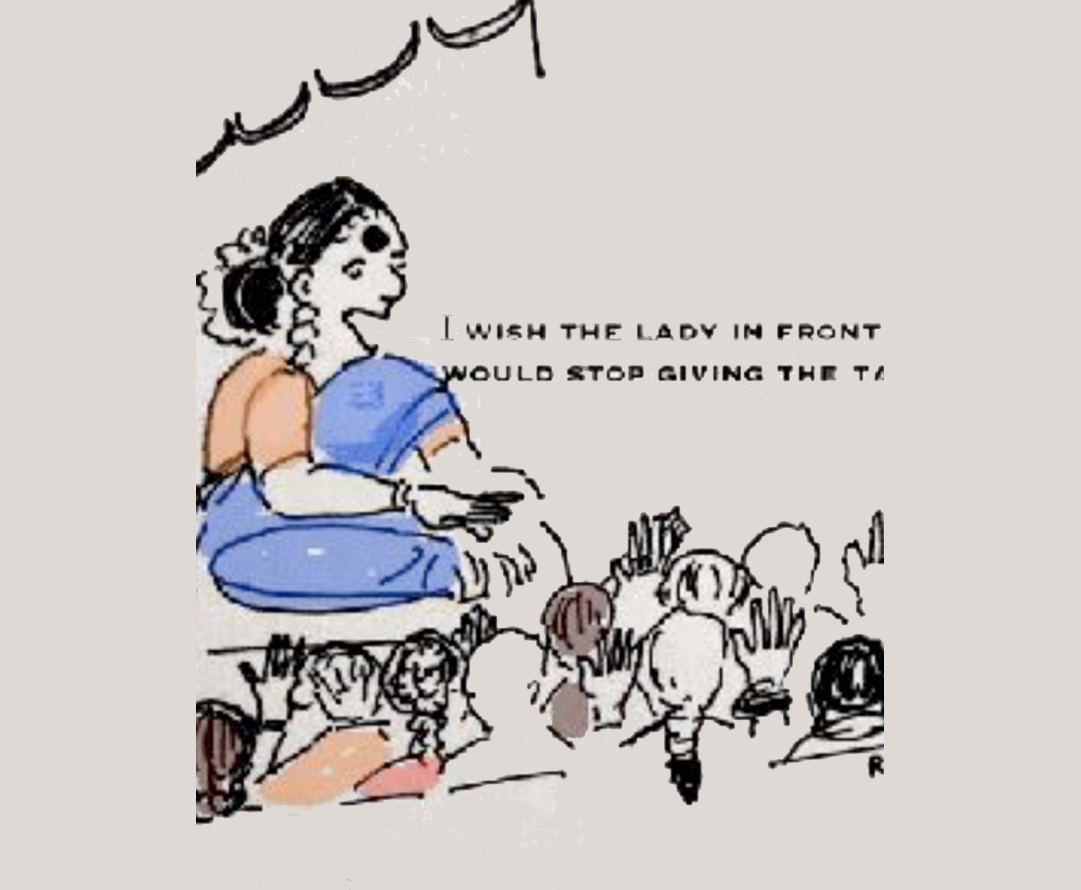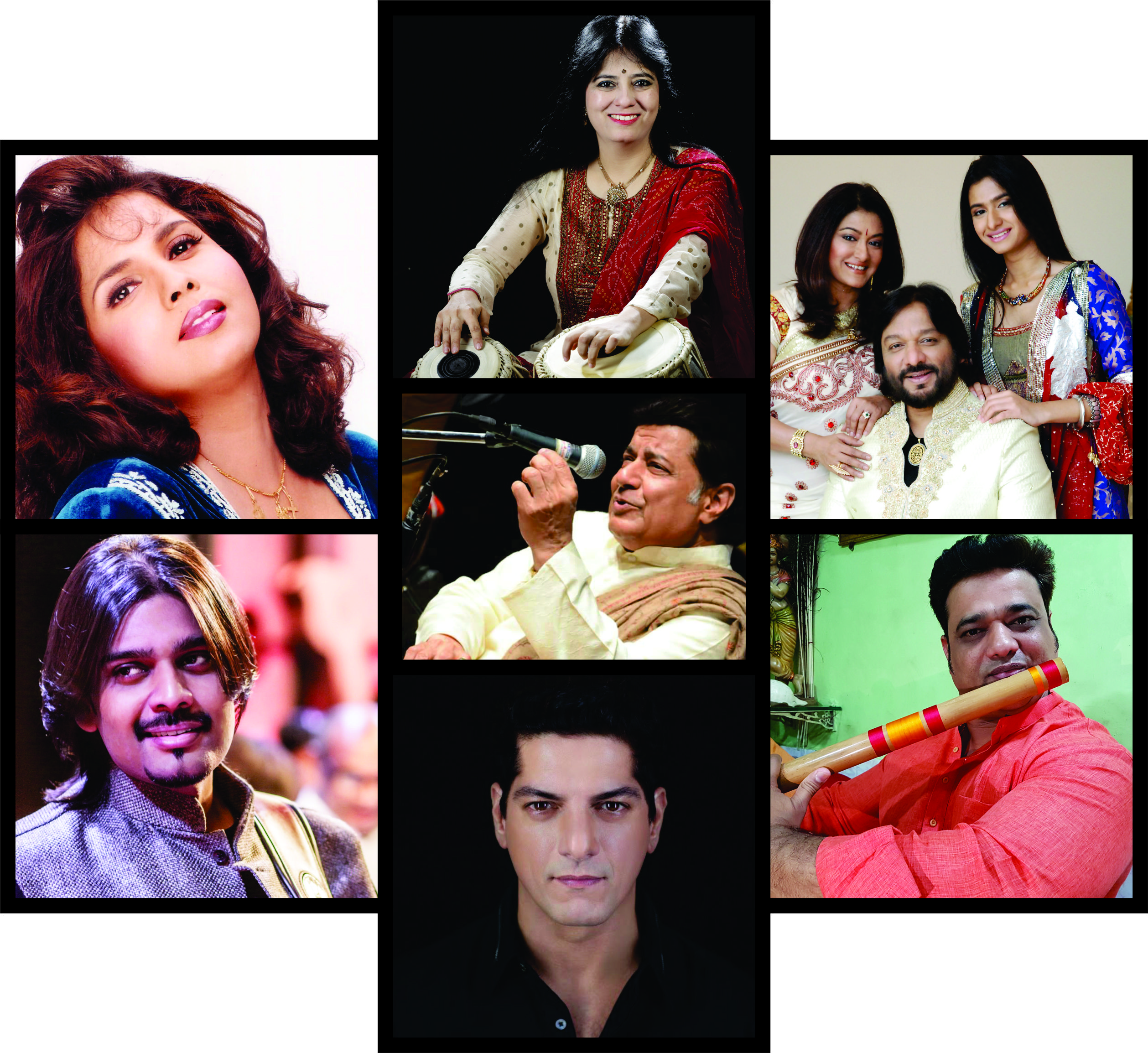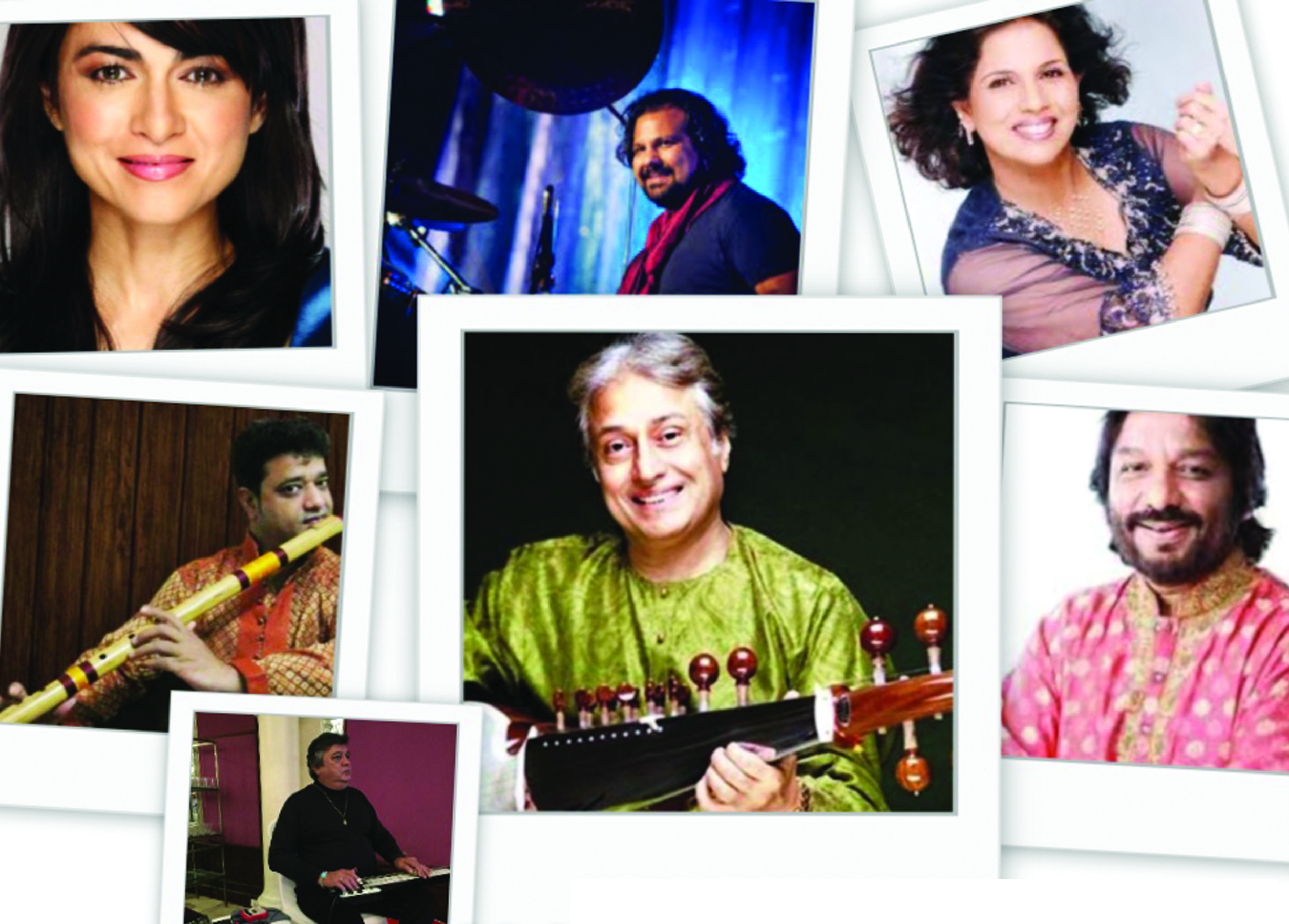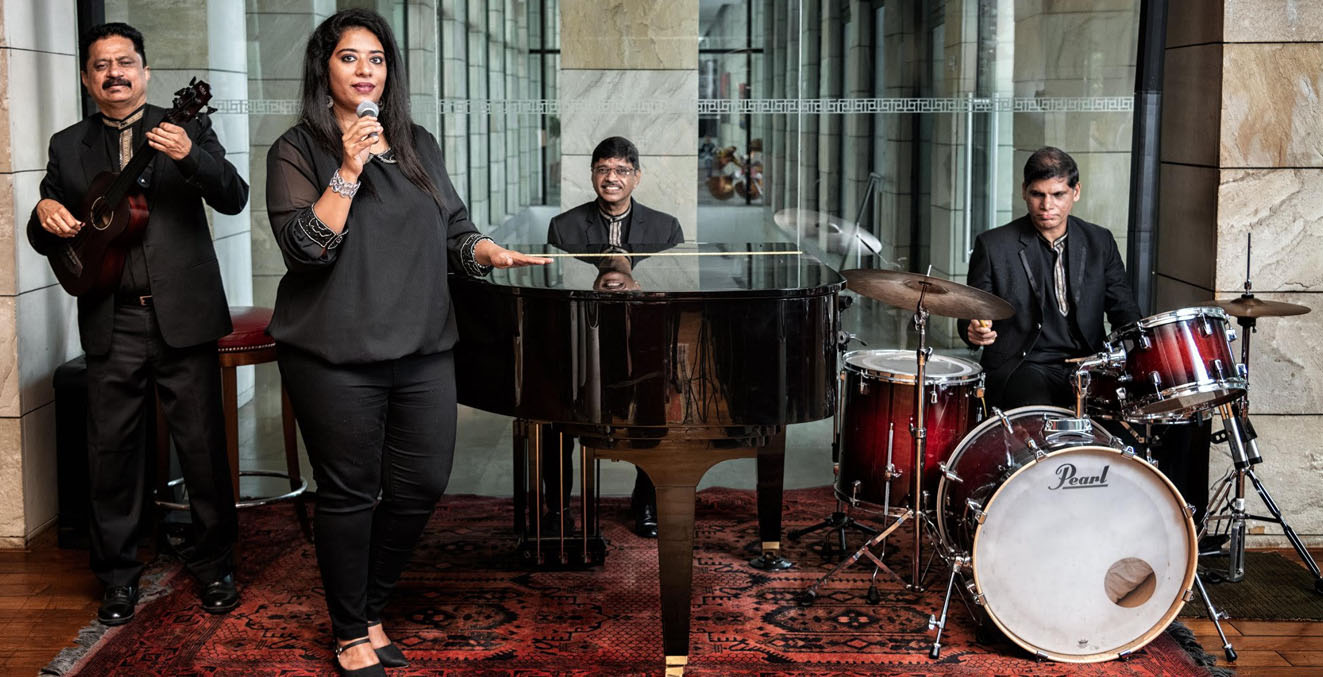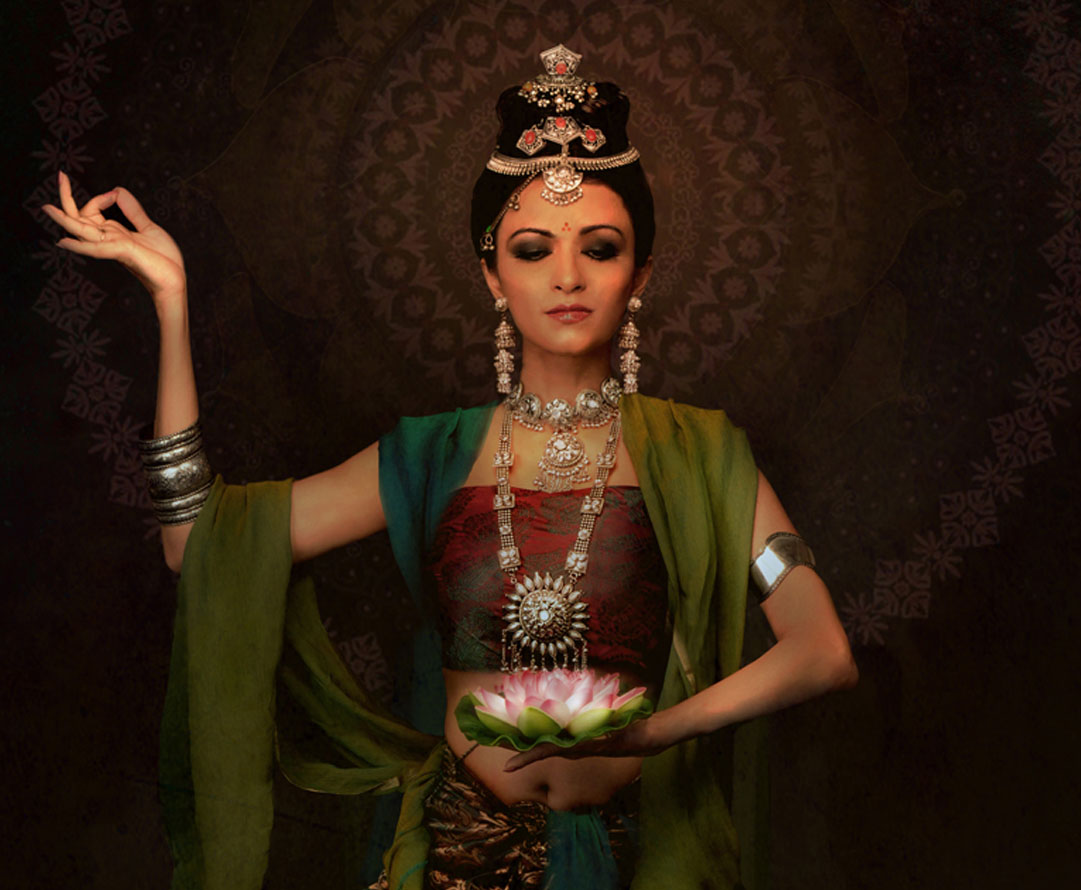
Melodious Yogini - Anaida
So we were trying to get in touch with Anaida and she was nowhere to be found. On her whatsapp her status was "In the jungles , bad signal. will return calls later". So we thought she had taken off on one of her numerous treks but a quick respond from Sandra her assistant told us she is away at a yoga camp.
Yoga camp we asked? what is she doing at a yoga camp?
She is doing a teachers training course , she will tell you about it herself , i do not know much more.
So it took two months before we heard from her, we were beginning to get worried and send a search party for you we said.
She laughed and said oh no. Everyone should be used to me appearing and diapering by now. I was doing a yoga teachers training course and was cut off from the rest of the world and it was absolutely divine.
So tell us more we said. We could hear her giggling with delight,There was a different kind of energy about her laugh and we pointed that out to her.
It does feel different doesn't it? I truly feel yoga affects your being overall, body, mind and soul .It affects your personality. Kind of "tunes you up" as to say.
So you been doing yoga for long?
This time she really laughs hard, believe it or not NO! This was my first experience! -I have hardly done any yoga but this course was some seriously intense stuff. 5 am to 8 pm kinda schedule... and you jumped in straight into an intense teachers training course? we asked, Oh yes! if you are going to do something then do it properly.
So are you going to be a yoga teacher now?
Well, if i do teach yoga at any point for any reason, i would be teaching it well . she quipped
Then why the training course?
See in the last few years and specially after the response to my meditation album and tracks , more and more life is taking me into directions of healing. I have been doing so many alternate therapy courses last 10 years and specially after my mom passed away. It has been a life long passion and how on earth would i forget yoga? This beautifully ancient physical science that this land and its wise humans have gifted the rest of the world? so i wanted to learn about it and so decided to do this course. So if i ever have to recommend yoga in my healing, i understand it in and out and my comments would be well informed.
So tell us more. how was it?
A revelation i would say. I am extremely fortunate to have found the teacher that i did. It made all the difference. You see despite being an artist and floating in the clouds with creativity half the time I enjoy the science of things very much. Also i like having a pretty open mind when it comes to anything esoteric and out of ordinary, yet, i have a very logical mind. I need things to make sense to me overall. It is all great to talk about energy and how its directed and this and that , but you can only talk freely like that when you do have a strong base , and i like it when something makes logical sense to me. makes absorbing it so much more fun. And this teacher approaches the subject with so much knowledge and sense. We discussed each and every bone, muscle and tendon and what it does and why and how of it and then in relation to yoga and Asanas etc. It was seriously intense and sometimes an overload of information and the other girls in my batch were already yoga teachers or practicing yoga for years. But hey, by the end of it. i nailed it and how! there is so much delight in her voice that we catch ourselves smiling along with her.
So are we going to be seeing her now in a yogini avatar?
Ooh I would love that. Am not sure what it would be but it sure sounds good. She chuckles.
So what else are you working on we ask her?
I have just got back into normal life and have to get ready for an art showing am having in Pune and a project am doing with food.
Food? what are you doing with food?
Will let you all know soon enough. All i can say is that it would be Yummy!
First i have to finish the plans for the art showing. am thinking if i should have it on my birthday for a change. Make sure you invite us then. we remind her with bells on. wish all your readers a happy new year for me she chirps as she bids us bye. We think she 'd look good in a yogini avatar.

InDoor Gharana - Hoping to Live
InDoor Gharana is a Hindustani Electro Fusion Band consisting of 3 members, Deepak (Composer/Guitars), Neehar (Composer/Keyboards) and Nitasha (Singer & Songwriter).Their music is an eclectic mix of being experimental, electronic, fusion, lounge, trance and folk. The core of the band's ideal lies in the fusion of diverse and distinct cultures, sounds, ideologies and lyrical representations. InDoor Gharana are the winners of the Songdew-Raga to Rock contest for the most liked Fusion Band held recently. Raga to Rock decided to check out the band and talk about their Music.
Q. What is the story of your coming together as a Band?
It started with a song - “Hoping to live”. Neehar and Deepak, already knew each other and were working together on some wonderful projects at Chennai. Nitasha wanted to learn more about Music Technology and that is when she met Deepak at an institute, where he was faculty. She sang one of her original compositions, Tore Bina and the ball got rolling.
Meanwhile Deepak came up with a few guitar riffs and progressions which were recorded. To that Neehar added programmed beats, chords and textural elements. Both, Deepak and Neehar really liked the way the track had a central theme of ”Hope”. But there was a Hindustani section in the middle which needed to be worked on. Both felt, Nitasha could add something to that section. Having already sent the track to her, there was a curiosity over what would come by. When we all met, she had composed a perfect part to suit the section. When she sang, we just knew this is it.
This one was an effortless, spontaneous collaboration between the three. Our music wasn't a representation of one person's ability, rather a unique amalgamation of the three individuals ability and we knew at that point we needed to do more songs together.
Q. How did the band name InDoor Gharana come about?
We wanted the name to represent our musical ideologies and uniqueness as a band. To be a bridge between classical and quirky. The name InDoor Gharana is wordplay and our modest homage to the gharana system of Hindustani music.
Q. Any special InDoor Gharana achievements?
It would have to be the release of our album, “InDoor Gharana”. The release was a culmination of years of hard work that we put into the making of each song. Each composition beats to the rhythm of our hearts and dances to the bliss of our souls. It brought forth so many emotions as we realized this dream. A dream we saw collectively, of bringing our music from inside the four walls to the limitless expanse of our audiences. To over 30 million households through the SongDew network. We feel fortunate, overwhelmed and deeply humbled by all the love and responses we have received for our music. Some genuine blessings, appreciation and encouragement for the work we do. To connect with our audiences in this way is extra special.
Q. Could you share some InDoor Gharana highlights:
1. Featured in Top 20 indie music releases of 2018 on Songdew
2. Over 10K+ hits in just a few days of our debut album release 'InDoor Gharana'
3. Our Album has time and again topped the list of Friday Hits and have been listed as the top 5 songs on Songdew.
4. Even before our release, our music was chosen by one of the most imminent brands of the country - FabIndia for their Fab Cafes, those are spread across the country.
5. We received unprecedented support for our campaign on thunderclap, in favour of our Album. Our target was to reach a humble 100 supports and we had a social reach of more than three lakhs!
6. Our single, “Aye Badara” garnered more than half a lakh views on youtube with in 2-3 days of its release.
7. And we performed on Chennai Live 104.8 FM, with RJ Tausif on "Artist Special".
(https://youtu.be/icE8KXyY-tI)
Q. What have been your struggles?
To balance different aspects of our work schedules and ensure we took out the time to jam and make music which we are passionate about. Not knowing what’s the right time to bring the album out. The confusions about the other aspects - which record label, monetary considerations... Involving the right video team and working out schedules around the shoot of the videos. The “if’s” and “but’s" about which track is perfect for a music video. To persevere, overcome the obstacles and complete the process as it pans out across years is overwhelmingly fulfilling.
Q. Your aspirations as a band.
The love and support that we have received from our audiences is overwhelming and it makes us work sincerely, focused towards growing in our craft and staying true to our music. That is all we want to continue doing, keep making our music and reaching out to our audiences.
Q. Could you tell us more about the process through which the songs came about?
There was not a particular flow of events that we followed through the songs. Each song took us on a journey and unfurled layer by layer. All we did was to keep following our creative instincts and build on that. At times the composition came in first (Tore Bina, Aye Badara), at times it was the groove that started it all, (Amaani Shukraani). At times the literature spoke to us, (Aye Sakhi). Each song has a story to tell. “Hoping to live” was recorded at three different places. It was like three composers composing sections of a song. “Tore Bina” was soulful and we experimented with lounge. “Aaye Badra” was a beautiful ode to the rains. “Jogi” tells a journey of a,’Jogi’. We are happy to have collaborated with Abhay Jodhpurkar singing the male sections for that song. Also we never tried to follow a Charnam - Antara traditional structures. We believed the flow is more important and should be intuitive in nature. So we never over-planned. Every song was done in a flow which felt right at the moment to our musical sensibilities.
Q. What do you do when you are not making music?
Deepak: I am quite passionate about the field of teaching and training. I feel that teaching is one of the noblest things one can do to stay humble as an artist. Imparting knowledge only makes you & the industry better. Being a part of A R Rahman's School "KM Music Conservatory", I had to stay updated as a teacher and now its just part of my lifestyle. I feel happy to contribute whether its by imparting knowledge or making substantial or minor contributions, to me everything counts.
Neehar: I am drawn towards sketching and painting. I enjoy the process of creativity finding a tangible outcome. Any art form has a structure or a symmetry. Sometimes it's well defined and sometimes blurred and abstract. I look for an imagery, a sense of connect. Does it remind me of a place a person or nature? Does it remind me of a past I have never lived? Art has to transform and impact and when it does, you know it’s working. It’s creation out of displaced, magical blocks. For me personally there are no rules. It’s just the blend that needs to feel right. The senses don't lie. So I wait till the time mind goes beyond logic and intellect and feels right. A zone where reasoning is absent.
Nitasha: I am a mother of a toddler, a yoga teacher, a training consultant and a psychologist, so that’s quite a few hats to juggle through. I am blessed to have the unconditional support of my family, my husband, Dr. Vikram Sharma and our son, Anaadya, even though he is just over 2 years. They both are extremely encouraging and understanding of my pursuits. That helps me to focus on different aspects of my life. At a deeper level I believe in harmonizing these different facets of my life. I truly believe in the pure potentiality that we all are predisposed to. To recognize and realize that potential, for my self and consequently helping others to do that is what I aim for.
Q. Piece of advice to artists and band carving their way in this industry.
Be authentic, leverage your strengths and create a unique niche. Amidst all this, be patient and perseverent.
Q. Details of any debut EP/Album release
Debut Album Name – InDoor Gharana
Record Label – Songdew
Link – https://songdew.com/albums/indoor-gharana/151
Music Video Amaani Shukrani – https://youtu.be/3uEkOrKO7DA
Music Video Tore Bina – https://youtu.be/4YVi3ZkmBdw
First Single – Kesariya Baalam
Music Video – https://youtu.be/-azSt-tl2E8
Second Single – Aye Badara
Music Video – https://youtu.be/L30bPPmxEOg


Sherrin V connects with 'The Circuit'
Sherrin Varghese has played many roles in a career spanning almost 20 years - Singer, musician, actor & host. It all began with The Rubber Band, the first band he played with, before he was picked and packaged along with four other guys, going down in history as India's first boy band, A Band of Boys. The Boys hit the big time with their 2002 debut album, Yeh bhi woh bhi, performing numerous gigs all over India and venues around the world. In 2004 they did their first film Kis Kis Ko. Since then the band members pursued their individual careers but still got together to release four more albums over the years.More of an indie musician, Sherrin too charted his own path, curating his own brand of Electro Pop, Commercial EDM / BDM, Dubstep, Tech House, Techno & his own genre which he calls Bollytronica. He has acted in a few films and numerous TV shows and also done lot of music and shows in the South where he has a huge fan following. He has recently launched his online show called 'Circuit' where he hosts various artists to chat and create music. Raga to Rock caught up with this multi talented artist to talk about his new show.
What is your show The Circuit" all about ... and its USP?
The show is called "The Circuit" & this is a live streaming chat show with musical performances by noteworthy musicians hosted by me.
It has a couple of USP's, firstly that it is a live show in the truest sense, cos we are streaming live. Which means there is zero post-production and the entire live switching, editing, lower thirds, show flow, encoding, streaming etc., are all done live. Since it's a live show the audience watching can participate, give comments & suggestions & they are are all attended to, responded to in real time, which raises the presence & kicks in the reward algorithms of the internet a lot.
Secondly this is a show with only performances by artists with original compositions of either the artist themselves or perhaps a song which they have originally sung or performed for someone else's composition, arrangement or production only. The performances & interaction of these artists with me, most of whom are peers and colleagues along with the live engagement leaves the audience in an immersive feeling of participation in the now & that's what I feel is the USP of the show.
How did your show name 'The Circuit' come about? not any influence of Munnabhai MBBS....
The name came about cos I'm a singer & music producer with heavy Engineering & tech influences and the insides of my studio looks like a Printed Circuit Board and when the time came to build an IP, I couldn't think of a better name, cos it literally is my circuit of people who are being put out there and they are handpicked based on merit only. Also it spins into pop culture references such as Pop Circuit, Rock Circuit, Indie Circuit, Bolly Circuit, Short Circuit, Off Circuit etc.
How did the show come about?
This was originally conceived as a 24 minute episodic content of 7 songs where each episode would have an original composition of mine, produced by writers, musicians, arrangers & producers who are better than me & the initial 20 minutes of each of these episodes would be interviews by the several artists, lyricists, musicians, music producers, sound, recording & mix engineers who have helped, write, put together, arrange, record, capture, produce, mix & deliver a master to these songs. The last 4 minutes of each of these episodes would be a live performance by an in house live band of the same song. I pitched the same to Harman Professional Solutions of whom I am an endorser and they wonderfully supported & came on board as the chief sponsor & provided all the record, capture & playback gear for the same. Several other partners have joined in, namely Musikshack who came on board as the instrument partner, Desi Tortillas & Sagar -The family Treat as our snack & food partner.
While putting this together I realised that just putting these 7 songs just like that on the internet would not create a ripple loud enough hence decided to produce the current live streaming episodes of guests performing their songs with interviews as a prequel to build up the property to a sizeable number of episodes and then drop these 7 episodes with my songs as the hero content of the season finale
Who are the Artists featured...and the best part of each one of them...?
These are all artists who I have a personal connect with and most of them are from my Indi-Pop batch from the 90's and just the welcoming nature with which they have agreed to grace us with their presence has been the best part about each of them. We've had multi-intrumentalist, Sidd Coutto, ace guitarist Chandresh Kudwa, Indie baritone benchmark act, Anand Bhaskar Collective, ultra talented Raman Mahadevan, mademoiselle Shibani Kashyap so far & several other beautiful artists lined up for Season 1.
How do you produce it..Budgets, sponosors?
Producing this has been a lifetime of my studying, learning & understanding of all my engineering, conceiving, conjuring & production skills coming together. They have all been tapped into & put together to produce what I believe has the potential to be a very unique & interesting show. This series has the backing of a highly efficient & talented crew comprising of an Executive Producer team, "iDreamzzs", who does the live switching/editing, streaming, encoding etc, along with my live sound engineer Sigmind Quadros, who does the live mix, ensures top notch audio quality to the stream & makes sure that the tech riders of each of these artists are met with all the gear and instruments provided by our partners. Also 2 young musicians & producers Nischal Chaubey & Adrian Fernandez who don the roles of tech assistants are the hands and legs of this show without whom the show would just not work. Just the research, trial & error & execution required for such a show has been so rewarding that we all thrive in the knowledge share & the DIY nature of it. Our main sponsor is Harman Professional solutions
The difficulties being a producer?
Everything about the show has been a huge learning curve. I had to take a call on whether to use the sponsorship monies towards hiring the right equipment & a professional crew needed to pull this off or to buy the gear and learn how to do a #LiveConcertStream with a skeletal crew myself as the former had no direct advantage except the launch of 7 songs for me.
I consciously chose the latter which meant researching, learning & figuring how to do everything right from lighting, camera work, switching, encoding, streaming on my own and then figuring a crew which would learn to do this with me & work through the trial & error. We finally bought all the equipment including lights, stands, chroma, cameras, switcher, encoder etc., & fixed my studio space into a shooting floor with all the audio video treatment needed. Then we created a design, look, feel, tone & the content needed to produce a show of this nature with this crew along with paid consultations from experts around the world who do such shows. I spent 3 months scouring the internet figuring compatibility, requesting demos, commissioning & buying the right equipment with zero tolerance error cos the budget restrictions meant that I couldn't afford to buy the wrong gear. The hard work paid off & I have put together a unique show which could become a way of life with me henceforth & right now I could give a master class in streaming anything!
My influences for the same are PhotoJoseph, Snarky Puppy, Sofar Sounds, Cercle & locally our very own Coke studio. All in all it's been a very rewarding experience and the very fact that in 9 episodes with 3 of them being completely trial & error ones, we have managed to pull off what generally takes an entire television network and channel to figure, I'd say we are in a good space right now with the merits far outweighing the difficulties!
![]() How has been the response to the show..Views, Interactions..etc.
How has been the response to the show..Views, Interactions..etc.
The response to the show is amazing. All our partners are very happy with the visibility and the interaction is top notch. Subscriptions have gone up on my channel and the comments keep us going and the best part about the internet is that anything you plant there, grows!
Plans for season 2?
Season 2 will see us going into product placements and endorsements and an upgrade into the content where I'll be calling singers, musicians, & artists to guest & collaborate with me on an original composition of mine which they will perform live with me & the in house band. This I believe will be the turning point of this property and if all goes well I see myself producing original Indie content and becoming a force to reckon with in the music field as a composer, producer & artiste.
I would love to be filling in the Joe Rogan, Jimmy Fallon space in our country with an extension of "The Circuit", currently on Thurdays to an alternative "Celebrity Circuit" on Wednesdays and also "Circuitry" featuring DJ's & Live Electronica artists on Fridays. Given that I have had first hand experience of working with Shekhar Suman on Movers & Shakers ( Sony Entertainment Television) for the same, I hope & pray all that experience comes in handy!
What are your future plans...songs ..album ,shows,etc..
This whole program has been conceived to release one original song, every week, constituting albums of work & eventually boosting the Live stage gigs which I'm prolific for. I met Prasoon Joshi on a flight who remarked that in India one has to constantly churn to be relevant. It is true for himself, Javed Sahab, even Shankar-Ehsaan-Loy & A.R. Rahman. Therefore I believe I have produced a platform which lets one churn at the economic & efficient best of oneself. I look forward to associating and acquiring more business partners onto this IP. Here on it is all up to the almighty. Praise the Lord!

The Trance Effect
As the song goes,
"Its alright, no more pretending.
Just ride without no worries
Its alright, don’t hide.....
Just free yourself and let it dance...."
Trance Effect, the Indie Pop Rock band from Nagaland takes us on a nostalgic journey through their music.They want to use their music to spread the message of positivity and overcome the hard times that people,specially the younger generation are going through with their music.Music really can heal the soul. We meet up with Trance Effect to know more about the members and their music
Give the readers a brief introduction of the members and how it all started.
We are a band from Nagaland. On Vocals, we have our dynamic and compelling performer Iuli Yeptho. Sosang Lkr on Drums, a quiet but an expressive player who never fail to capture the right beat at the right time. Temsujungba on guitars, the bigger than life character and an outstanding showman.Tako Chang on Guitars, his unique approach to music sets him apart, drawing more into melodies and catchy riffs. Imnamaong Imchen on Bass Guitars, with his experience for performing life music and minimal playing adds just the right amount of colour to make the audience groove into the music.It was in fact our bassist who came up with the idea of the band. He was keen on making music in a band and sounding like no other,but honestly it’s because we came together to make music that all of us enjoy- I guess you could call that our secret ingredient.
Can you name the Biggest influences of the band. What inspired you guys?
We are influenced and inspired every time when we see a great live performance. It was the love to perform live music and create music that drew us into forming the band, it motivates us into putting in the hours until we get the music straight. We grew up watching our local artists and bands perform, they’ve had quite an impact to all of us.
How would you guys describe the bands sound? How are you guys different from other bands in the country?
Well,we would describe our sound as somewhat of a melodic approach to the Indie genre of music. We're all from different musical background and genre but the love to create beautiful melodic music brought us together.
The bands Name 'Trance Effect' how did it come about? What is the story behind the bands name?
Well, we wanted a name that would set a difference to the music scene in the country, that's why the name Trance Effect, which is a more melodic off shoot from Techno or House music is what drives our music even though we don’t have a DJ in the band. So, we named the band Trance Effect.
About the journey so far,how has the experience been?Tell us about you favourite gigs and festivals?
We'll,so far we've had a few gigs and played at festivals like Orange Festival in Dambuk, The Drift Music Festival in Guwahati but yes every gigs would be considered as the best because of all the different venues and different crowds. It helps us to make a beautiful story of our musical journey.
Tell us a little bit about your single ' Stop Pretending' what inspired the song?
The song was written by our vocalist and it talks about the struggles and hardships a person faces in life. It talks about trying to Stop Pretending to be something one is not and to have a positive view on life. Well if you guys haven’t listened to the song then you can just stream it from all the steaming platforms like Apple Music, JioSaavn, YouTube etc
Any upcoming release,if yes give an insight on what's next for Trance Effect?
We're working on our EP right now and yes Hopefully, we may have it completed by the end of this year and also a music video along with it.
Lastly, any message to the readers and your followers.We’d just like to say be who you are, be original and just spread love. With our Dedut EP coming out you are going to see a different side of us. So, let’s go on a musical journey together. Thank you for your support, we love you.

Since 90's
Music bonds people together.Here are Five guys who came together because they shared a common bond in making music.What started out as a church worship band has now become what is known as the band 'Since 90's'.
The group are making their mark in the music industry of North East with thier catchy guitar riffs,Exceptional vocals,incredible drum beats and sensational bass lines.Here is something for the readers to know more about the band.
1.Share a brief Intro,a little bit about the band,how it came about, who you are, where you're from?
Hello, we are Since90's, a Rock band from Dimapur, Nagaland, consisting of five guys who share a common bond in making music of our own and more importantly we just love playing music together.
Before the Band thing happened, we were strangers club together in a worship team and there was no looking back from that point on cause we clicked instantly, we loved the friendship we had so we decided to form a Band, a band we believe to be rooted in brotherhood.
2.What sets you apart from other bands of the state and country?
There are alot of incredible Bands in the state and we look up to most of them even now and we are still in the process of learning, to find our own foothold, taking in advices and creating our own music as we continue to grow.
3.What kind of Genre do you guys play?Give an insight of how you guys compose your music?
We can be considered an Alternative Rock Band from the way we sound yet we tend to switch our sound every now and then but that's the closest we can get in terms of genre.
Composing our music is quite intriguing because all the band members contribute in the process so we don't have a rigid system when it comes to compositions though we remind ourselves not to be forceful in finding the melodies, riffs, tunes etc. So that the music we create remains genuine.
4. What are your major influence as a band?what inspires you guys?
The first thing that influence us as a band is our faith and the belief we share together beyond the music. Apart from that we are heavily influenced by bands we grew up listening too including the oldies and not forgetting our own local bands and musicians.
We are inspired to go further by the people surrounding us, supporting us every step of the way, we are very fortunate to have such a close tight knit family.
5.Can you guys share to the readers about your single "Against my vices"?what the song talks about?
'Against my vices' is the first song we wrote together and the song talks about the human side of us with our fast pace lifestyle we tend to forget that we all have a constant war going on inside of us and we burn ourselves out trying our best not to become the person we hate simply put it's about owing up to our past mistakes and forgiving ourselves and others. Our new song 'Leave It On The Line' is a continuation of this song since they draw inspiration from the same source.
6.How has the journey been so far?Are you guys planning on any future releases?
The journey so far has been great, we never anticipated that people will notice us the way they did and we are truly grateful for everything.
Yes we have a new single coming out with an EP as a follow up soon.
7.Lastly,any message to your followers and fans.
To the people who has been supporting us since day one we are very grateful for all the love you have shown towards the band and we will surely continue to churn out good music for everyone, thank you all so much.
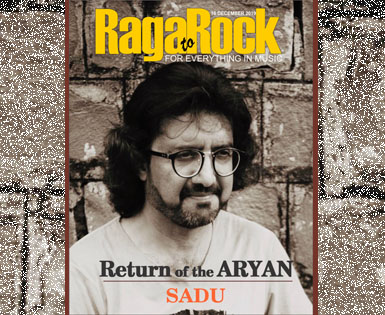
Return of the Aryan
Sadasivan KM Nambisan better known as Sadu is a singer, composer, lyricist and producer and founding member of The Aryans one of the biggest indie rock bands India has produced. He learnt western classical piano under keyboardist V C Varghese and Hindustani classical vocals under Pandit Brijmohan Dixit. He got his first opportunity to play keyboard at the age of 19, with an orchestra at the local Durga Pooja festival. Sadu then went on to play in a several orchestras before starting to play professionally with the Sargam Musical Group of Madhya Pradesh. In 1998 he along with D J Narain and Jai Walia formed The Aryans. The same year they launched their first album on Polygram Records. Ankhon Mein Tera Hi Chehra became a super hit and they have never looked back since.
Here Sadu talks to RagatoRock about his eventful journey and passion for music.
Tell us something about yourself.
My name is Sadasivan KM Nambisan but professionally I am known as SADU. I was born on 7th September in Kerala, till I was a teenager I grew up in Ooty, and later on in Madhya Pradesh since my Dad was with the defense services, he was transferred regularly. My academic qualification is Master of Science in Organic Chemistry with specialization in Environment science, I am a half scientist. Also in sports I have clocked 10.69 seconds in 100 meter sprint and won bronze medal in the all India inter university championships. Then finally I shifted to Mumbai to pursue Music.
When did you get interested in music?
I started of my music career in a small town with an orchestra group but was keen in making my own songs hence shifted to Mumbai in 1996 and met DJ Narain & Jai Walia to form Aryans . Universal Music formerly known as PolyGram launched us with our first sound track album for the movie, ‘Ankhon Mein Tera Hi Chehra’ starring Shahid Kapur, which was an instant Hit in 1999. Then followed ‘Yeh Hawa Kehti Hai Kya’ in 2000 & ‘Dekha Hai Teri Ankhon Ko’ in 2003, all blockbusters, and then poured in extravaganza of awards - MTV, Channel V, B4U, ETC and what not.. We then grabbed lots of concerts all over the Globe. Me and DJ released ‘Hai Dil’ with Times Music & ‘Kehta Hai Dil Yahi bar Bar’ with T-Series in the year 2006 and 2009 respectively. They did Ok but then we had our own commitments too.
Is that when you decided to go solo?
I own a Pharmaceutical Company named Sadu Pharma, Time passed by we kept on doing concerts. Then I released my first solo of two Ghazal-Rock singles with Times Music in 2015. It did pretty well, the music was an amalgamation of guitar, drums & ghazal written by Jigar Muradabadi. I started a video production company ‘Seventh Angle Production’ and later on ‘Sadu Music’, the Music Company which is specifically and only for Independent Music Releases. I am a Singer, Composer & Lyricist and it's easy for me to produce songs. My production is in full swing. I am planning to release 10 to 15 Solo Pop-Rock mesmerizing and amazing singles every year. To start with am releasing 2 singles in 2019 under my music label.
What do you think of the independent music scene in India?
Indian music scene is quite dim, I mean music should not be imposed on you. For the last 70 years we have been strictly forced to listen to film songs. All through the years the ways and means of music exposure and platforms to exhibit or showcase any kind music was either radio or television, which were primarily dominated by playing film songs.
Indian audiences have been deprived of exposure to the wide spectrum of music which could have been commercially viable. In fact the Indian flavour and essence of musiclike folk, sufi, classical & spiritual music is not getting the recognition it deserves. The British left us decades ago but unfortunately we Indians are carrying the hangover of still being slaves mentally and accept everything we've being served.
Why has India not produced any great independent artistes, compared to the West where music is propelled by musicians and bands?
Talking about Rock and pop stars of the west look at Bryan Adams, Dire Straits, Queen, Eagles, The Beatles, Michael Jackson, Madonna, George Michael, John Bon Jovi, what tremendous attitude they have in their songs. India saw a few bands and artists with attitude in the late nineties and early 2000, Lucky Ali, Silk Route, us The Aryans, Euphoria, Parikrama , Falguni Pathak, Daler Mehdi, Sukhbir, Ali Haider, Nazia Hassan are few names who started and created new west kind trend of pop-rock culture in India but faded out getting over shadowed by film music.
What are your views on cover and DJ versions of popular hits?
People climb on cloud nine and glorify themselves when they do an elegantly safe job COVER of an already hit song again. Plagiarism, brother it's a copy. Singing an old song out of passion in a bathroom is fine but any commercial usage leads to a challenge and disrespect to the original creation and creator. I will definitely call them spineless, that's the reason I started off this paragraph with 'people' and not singers. It's as if you are putting your name plate on somebody else's home.
Dressing up to the best and shooting a music video of a copied song shows how desperate they are to achieve temporary success. These shortcomings never stay for long. I always say 10 claps for your own song is way better than ten thousand claps for a cover song. Sing and enjoy your own song. According to me if you can't create music you should Quit, you should do a job elsewhere.
It seems that is what people want, so what then is the way forward?
I should say Indians are possessed and obsessed by films and its songs. There's more in store. It's high time to overthrow the prejudices made by few individuals of riding films on songs, unaware of the later consequences on the original music. It's unfortunate that lot of independent musicians have not been recognized and given worth as they deserve, avenues and careers of lots of musicians have been shattered by this trend in the last few decades. I would request all aspiring young musicians of India to come out in full bloom with their original music whatever genre it may be - instrumental, folk, songs, ghazals, plays, qawwali, bhajans, rock, pop and let the world know you.
What are independent artistes doing about this and will it really make a difference?
I do know a few upcoming artists with immense talent who are swimming against this worse tide and fighting the whirlwind, good luck and God be with them, I am optimistic and anticipate a great lot of change in Indian Independent Music. I also expect that the audience realizes, accepts and chooses independent music as mainstream music and not film songs.
What is your advice to young and upcoming artistes?
Now since it's digital music all over, there are more options to showcase and sell your music I invite all good talents on floor. My advice to youngsters is to not make music on demand or for others, make your music with passion without any restrictions for yourself and enjoy it, the world will enjoy with you. Make your own way and do not flow with the river. Never make or do music for bread and butter. Till the end of this planet music will be created and heard but the spine and Essence is simple melody and nice lyrics.
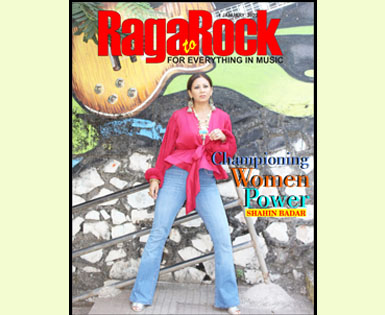
Championing Women Power
Shahin Badar is a versatile Award winning Singer/Songwriter, acclaimed worldwide for her vocals in The Prodigy's banger, 'Smack My Bitch Up', and made her legendary. She has collaborated with various world renowned producers across the world covering music genres like EDM, Trance, House, TripHop, Pop, Sufi over which she implemented her production ideas. Her collaborations includes the likes of Indian Ropeman, Bobina, Gemini Brothers, Noise Control, Doug Laurent, Kaya Project, Gio Makyo, Jah Wobble, FX, Fraser T Smith, Twista and Juliet Lewis and many more. She is also credited with successful albums like 'Laila' and 'Destiny'. Recently my vocal Chants of 'Smack My Bitch Up' got sampled by USA Rapper ASAP Ferg for his single 'Floor Seats', and also in a series BALLERS starring Dwayne Johnson. Both hugely successful in USA.
Shahin Badar's vocal contributions feature in over 50 international film and TV soundtracks like the UK Music Hall of Fame, the Lara Croft Tomb Raider:2, Charlie's Angels, Scary Movie 2, Closer, US sitcoms North Shore and Kevin Hill, and Sky News broadcasts. She has also sung in Bollywood movies for A.R. Rahman in Zubieda & Yuva, Dhai Akshar Prem Ke to name a few. Raga to Rock caught up Shahin Badar during her stay in Mumbai to find out about her Remix versions of 'Jaag' and her future plans.
Tell us about your song 'Jaag'
'Jaag' is an edgy and hypnotic song about women empowerment, that revolves around awakening one’s resolve for independence, breaking the shackles of misogyny and appeals to the listeners to move forward without being tied down by age-old customs and norms.I have released 4 Remix versions of my single ‘Jaag’, the remixes have been produced by world famous EDM Producers like DJPodje from Ireland of “4SuMotion”, he has produced the Vocal & Dub Mix. The 3rd remix has been produced by UK DJ & Producer Juttla and the final track is also produced by UK based Kaya Project.They have done a fantastic job on the remixes.
Tell us how do you use your work for the empowerment of women ?
To me basic core of humanity is understanding and respect. All my Music videos have a message for women about her Power, Strength, Belief, Struggles and Guidance, who continues to fight for her rights through peace, understanding and knowledge.and that is what I am trying to spread to the world.
Who inspired you to be a Musician?
My mother is my inspiration, she trained under Naushadsaab and Emdad Khan Sarangiwala. As she was not allowed to pursue music as a career, it was passed on to me! My mother also writes Ghazals as a hobby, she has penned two of my tracks "Laila" and "Jhoom Jhoom" on my debut album.
Give us a few names and experiences with the legendary Artists who you have worked with?
I have had the pleasure to work with several Legends, all were unique. Its honour to work with Hollywood Music composer Michael Dannah for the film, 'The Hulk', I shall always remember the way he greeted me. A.R.Rahman was a little shy but a wonderful person to work with, we had some great laughs. Above all great respect goes out to our legendary big beats man Liam Howlett, when recording my vocals for 'Smack My Bitch up' it was truly exceptional.
How does it feel being called the voice of The Prodigy?
You made me smile, I guess the chant on 'Smack My Bitch Up' has left it's mark in the history of EDM music. A great honour to be associated with The Prodigy. At their concerts, to hear the fans sing along to the chant with such devotion is unbelievable, used to brings tears to my eyes. The Prodigy fans around the world are No.1 and I love their humility and crazy energy!
How do you feel with the loss of Keith Flint?
It just does not feel the same without Keith Flint. May his soul rest in peace.
Why have you not sung in Bollywood soundtracks?
I have recorded three tracks with Oscar winner A.R.Rahman. My vocals featured on the track, 'Dol Dol' on Mani Ratnam's film Yuva and I also delivered alaap chants on the back ground score of the film Zubeida. I am stil waiting for Azizi to be released. A fine track produced by Rahman and written by Mehboob.I would like to do more work. Over the years, I was extremely busy taking care of my parents. I haven't had much chance to take time out for myself until now, I am also hoping to work with some cool Music Producers from India this year.
Where do you see yourself 10 years from now?
Would love to continue with my travels around the world, meet beautiful people who will keep enriching my life with their knowledge of grace and kindness. Rest we hope, depends on the Almighty's Good Will.

The Bollyboom Story
On the eve of the 8th year of Bollyboom concerts, we caught up with Mr. Manuj Agarwal, CEO, Percept Live, to share his views on the journey so far, Artists, and his competition.
How has Bollyboom progressed over the years?
Bollywood music has been a vital part of every Indian and by combining this with the beats of Electronica, state-of-the-art production, SFX, and the best of Bollywood Artists we knew we could offer a brand new BDM twist and create a unique Live Entertainment experience for the huge numbers of Bollywood music fans all across India and overseas.
Bollyboom was launched in 2013 and featured legendary music maestros Sonu Nigam, Shaan, Salim-Sulaiman, Shveta Pandit, Shraddha Pandit, and Shadab Afridi who set the stage ablaze with their foot-tapping, head-banging music specially created to the infusion of electro beats of DJ Lloyd, DJ Nik & AJ, and Acid. Over the years we chose the most popular
Punjabi Bollywood / Pop Artists like Guru Randhwa, Diljit Dosanjh, Honey Singh, Badshah, Amyway and many more who are immensely popular amongst the youth.
Seeing its growing popularity, Bollyboom evolved into multiple formats. We launched Club formats which ensured a national reach and also gave us an ability to introduce and promote young upcoming Bollywood DJ talent pan India.
A pioneering initiative saw us take over popular traditional Indian festivals under the Bollyboom banner and create a brand new revived experience for the youngsters who were already used to celebrating festivals such as Holi, Valentine’s Day, Baisakhi, Friendship Day, Christmas and New Years Eve with popular Bollywood music. ‘Bollyboom’ is the ONLY all
India and even International brand in this space.
We have also produced and launched many successful International Bollyboom shows across Kuala Lumpur, Dubai, South Africa, Singapore and more. In fact Bollyboom Valentine’s 2020 is all set to rock Dubai with Indian pop-rock band Sanam ft. Sanah Moidutty Live on 14 February 2020.
Why have you repeated the star artist Diljit Dosanjh again this year?
This isn’t a repeat artist show but a continuation of the Bollyboom Multi-City India Tour 2019- 20 with Diljit Dosanjh that we had announced earlier in October 2019. The enthralling multi-city pan India tour with the popular Punjabi heartthrob kicked off on 9 November 2019 in Pune and 23 November 2019 in Bengaluru to great success and we are now ready to rock Delhi on
2 February and Mumbai on 22 February, 2020.
Diljit Dosanjh is a remarkable and versatile artist who wowed audiences at the primary Bollyboom editions as also fans around the globe all through last year. Diljit Dosanjh has seen his popularity graph soar not only due to his powerful and foot tapping melodies but also because of his memorable and impactful performances in the Bollywood film industry. We are super thrilled to have him on board as part of our Bollyboom Multi-City India tour. The Pune and Bengaluru shows were a massive hit and we are thrilled to bring him closer to his fans across the cities of Mumbai and Delhi therein offering them an incredible opportunity to witness his electrifying performance live and up close.
Bollyboom has many smaller artists performing during the year; this is more a branded event rather than a Festival? Your view...
The scale and size of Bollyboom cannot be replicated across every metro or town as it wouldn’t be feasible given the limitations across India of infrastructure, venue availability and access, permissions and increased costs translating into expensive tickets for the guests. However given its growing popularity we had to ideate and create new sub formats such as mini Arenas, Pop Ups and Club formats which not only ensured a greater national reach, but also gave us an ability to introduce and promote young upcoming Bollywood DJ talent pan India.
Bollywood Music has been a lifeline of India for ages now. Every Disc, Lounge, Club, Wedding, Birthday Celebration prominently has Bollywood music being played in its original & remix form. Percept Live’s Bollyboom events offer an extra edge – not just the variety of both established and new, upcoming Talent across cities, but also an intrinsic mix of the best of live
entertainment elements spanning live percussionists, exotic live performers, curated F&B and above all, a safe, secure, seamless experience for all attendees making any Bollyboom show a success time and again.
How do you look at BollyBoom as compard to the other 'Bolly' events?
Having the ‘first mover’ advantage with Bollyboom certainly gave us an edge compared to many other ‘me-too’ Bollywood live event shows that popped up after Bollyboom’s launch in 2013. Bollywood music infused with the beats of Electronica is a phenomenon that's become only more and more popular since inception and has become the number one music choice of
the youth today. And proof of this is seen in brand Bollyboom’s phenomenal growth over the past 7 years across India and overseas.
We also undertake a lot of research, given the dynamic pulse of the millennials. Over the past 7 years we have continuously innovated, tested, experimented, and introduced newer and multiple variants recognizing the potential of Bollyboom across India. Bollyboom offers not only the latest trending artists and tracks but also an amorphous blend of Trance, House, Hip
Hop, Electro Funk, Synthetic, Pop, Club Music, Techno, Trance, Hardstyle and Dubstep to keep up to step with whatever is trending and popular with our fans. Our focused dedication towards delivering the very best is how we have remained successful and grown versus a sea of impressionist Live Entertainment options available in the market today.
Our brand name and credibility has also certainly helped - Percept Live has been instrumental in blazing trends in the music and entertainment industry since decades and fans know that any Live Event IP from the Percept stable offers a unique, state-of-the-art, guaranteed VFM experience. We already had a huge fan following with the youth across India & overseas
courtesy Sunburn, and another IP from our stable in the live music space carries the advantageous stamp of credibility and authenticity for our fans.
Going ahead I see Bollyboom growing massively to tap many more markets across India as also overseas. We are already working with top talent and in future we will add many more prestigious names to this roster. Plans are afoot to create a curated Bollyboom show which will travel globally like ‘Sensation’. Besides that our calendar will expand to have at least 200 events pan India and overseas annually.

Nuka Blazes New Path
Anushka Manchanda had taken on the new avatar of Nuka, when she launched her debut single' 'Don't Be Afraid', is out with a searing new track, 'Ayo Burn', which is a scathing, no holds barred comment of the things that have been happening in the country in recent times. Nuka has been many things as Anushka. She came into prominence on one of India's first reality shows. She was picked from among thousands of aspirants to become a part of the phenomenally successful all girl band, VIVA!. This led to her being signed on as a VJ with Channel [V] and assignments with various TV shows including Fear Factor and MTV Stuntmania because of her passion for motorcycles.
From there on Anushka moved on to playback singing, first in South films under music director Yuvan Shankar Raja and then on to Bollywood with leading Music Directors like Vishal-Shekhar, Sandeep Chowta, Anu Malik, Eshaan-Shankar-Loy, Salim-Sulaiman to name a few. She was is now blazing a new path in her new avatar and it is everything she stands for.
Who is Anushka - Singer, Actor, Producer?
I am an evolving artist, refusing to be put in a box. Being a singer, an actor, a producer, a director, an editor..these are all different vehicles of my expression. In this moment, I am proud to be one of the voices of India, out on the street with my brothers and sisters, working hard to protect everything my country stands for.
How did you become a Music Producer? How did InkInc come about? Are you also a stake holder?
I got irritated at having to depend on other technicians to create what was in my head. So I took a music production course. IncInk is the lovechild of Navzar Eranee, the seed of which was sown when we all gained access to some of the best talent in the country, through a project we were working on. No, I am not a stake holder.
Who is Nuka? Why another identity you are already famous as Anushka Manchanda?
Nuka is who I really am. An artist producing art without any adulteration or censorship. With Anushka Manchanda I have done work for years on films and projects with other people. I wanted to separate the two, only to make it easier for people looking for the art or music I am making now.
Do you like to produce Music in English language? Do you play any Instrument?
I think in english and I write best in english too. I play piano.
Tell us about you song 'Ayo Burn', what is your statement/message? Any other info you would like to share?
I say pretty much everything I am feeling in the song! There is so much apathy, and things have been bad for a long time..but today I feel a new ray of hope. The youth is out on the streets. People are listening. This song is meant for those still sitting on the fence. We need you. And we need you now!
Are you sending a message to the current Political establishment?
This song is being sung to people like you and me. It’s for us to take responsibility. If we sit back and let all of this stuff happen to us and the people around us..then are we any better than the ones causing this?
Would you venture into Politics?
I’m not politically motivated, never have been, although I am paying more attention to what’s happening in the country today.
Whats your next song/album?
I have a track I’ve produced for Kaam Bhaari which you will hear soon.
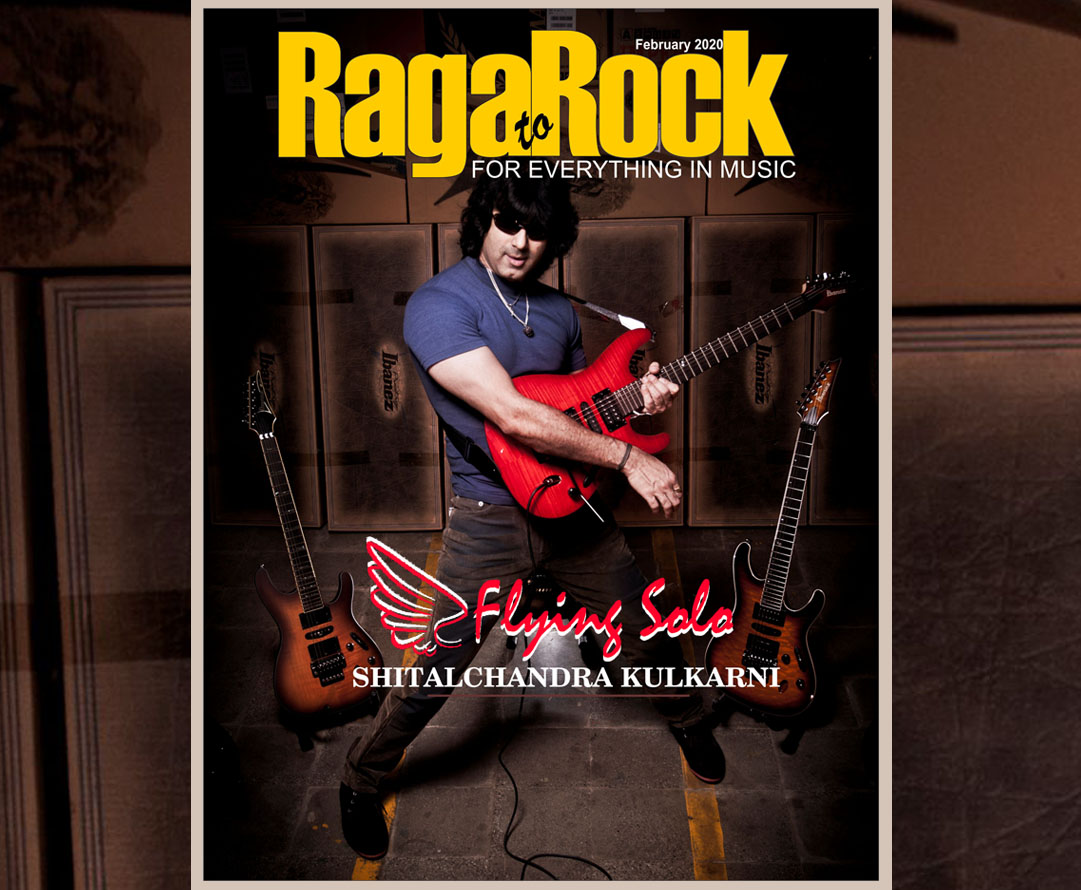
Flying Solo - Shitalchandra Kulkarni
One of India’s leading guitarists, Shitalchandra Kulkarni is the front man of renowned rock band, Tungstn and brand ambassador for Ibanez Guitars. Over the past three decades he has been a composer, producer, performer and teacher with body of work including live gigs, albums and various projects ranging from personal, to festivals, films and corporate events.
He recently released his first solo album titled, Endless, which is a bold departure from the conventional in that it is a completely instrumental one. It is also a testament of Shital’s self confidence and belief in his ability to hold the interest of his fans and audience.
Shital picked up his first guitar at the age of five and fell in love with the instrument and over the years his favourite guitar has been Ibanez. His first band Tallfathins won the all India Live Wire band contest at the IIT Mumbai Festival in 1990 and his second band Tungsten, later Tungstn with trimmed lineup, brought out two albums – the first a self titled double album and the second titled, Jumpstart.
Shitalchandra is an ex music faculty at Flame University and he also runs the Institute of Modern Music, which was founded by his father Suhaaschandra Kulkarni a well known accordionist, back in 1965. He set up his own studio, Chords India, in the early 90s and worked on over 400 commercial titles but for some years now he has been using it for only his personal projects.
Here Shitalchandra Kulkarni talks to Ragatorock in this indepth interview, about his passion for the guitar, the independent music scene and his musical journey through the past three decades.
When did you decide to be a Musician?
I had a musical background and I came from a musical family. My father is a professional musician. His principal instrument is Accordion, and music was always in the family, and from the time I started understanding that I am completely drawn towards creativity and playing, music is what I decided I want to dedicate my life to.
If I have to go way back, I started learning the guitar when I was in 5th standard, performing for school gatherings, competitions, imitating label songs was my first ladder, that which I continued for few years and this initial learning, studying, progressing years gave me an insight that I am meant to be full time in music- in all departments.
Tell us of your style of Guitar playing? Your favorite Guitar players & influences in your music?
It is very difficult to self analyze my playing, I have never done that, I always followed my instincts and spontaneity than the technique but of course I tried to polish my skills and playing techniques, and handling the instruments from the sound perspective is of utmost importance to me, and the way it is heard.
Guitar, as an instrument has various styles and has been improvised by various players. Imitating is fine initially, but finally the player grows only when he imitates himself and that’s exactly what I have tried to do over the years. Trying to imitate what plays in my head and unfortunately after playing for decades I have still not being able to achieve that.
But yes like all guitarists I do have my influences which start way back from my school time.
To name a few, Ritchie Blackmore, Eddie van Halen, Paul Gilbert, Steve Vai, Steve Lukathuar, R.D.Burman, Yanni to name a few.
Tell us about your latest Album?
My new project, a instrumental guitar album is called ENDLESS. This album is going to be released by songdew.com in three parts over the next one year. The first part consisting of six tracks has just been released last month.
Its a new thought I feel of replacing vocal by instrumental notes and improvisation. Every track is shaped with a fixed composition with a canvas of production giving the listeners a surprise elements everytime they listen. Every track has been thought with some context keeping a certain vision and emotion in mind. For example -
Super Ride talks about a drive , about a skilful ride,
Dark Street- talks about anxiety to fear to rise,
Run For Cover- talks about speed and chase,
Water- different expressions of water in classical manner,
Take Me Through- Chemistry between guitar and EDM,
Beat The Heat- Full on groovy and rock and roll.
The entire album's composition, production, sound design, and playing is done by me taking the support of my two ace engineers Mr. Gaurav Korgaonkar for music synthesis and Mr. Shridhar Deshpande who recorded all guitars and mixed the album.
The album was mastered by Mr. San Page at Page Productions. The entire album is recorded and mixed in my studios - Chords India, Pune.
ENDLESS is an album which will redefine instrumental music and people who even don't listen to instrumental music or guitar oriented music can also enjoy this project.
Why did you want to make an instrumental album?
I was always vocal composition oriented person, right from the beginning of my career, I always did vocal music where guitar played the role of accompaniment but parallelly I always thought that the way I handled my instrument, I could do more than just the supportive role. Instrumental music, instrumental pieces, colouring the pieces or the solos was always my parallel musicianship, that made me write lot of instrumental germs as scratches which eventually I have produced them to some extent in ENDLESS. I always wanted to do an instrumental act where I could get the freedom of play but discipline of composition and that was my main drive to do instrumental project.
While being a full time musician how did you manage all your other activities?
Well that's a good question because managing domestic and professional life is always a challenge Though I am full time into music I always worked for myself and on four fronts, Teaching, Studio work, Music Faculty at FLAME UNIVERSITY, and Personal projects.
Finding time, making time, giving priority, forming an Agenda, financial aspects and food, to creativity doing a balance of all this, is always tough. Still since I call myself a professional musician I have always tried to streamline all my musical responsibilities backed-up with musical academics and my personal life too.
Sure...not that I was 100% successful, but yes with few highs and lows.
Tell us about your studio and institute?
My institute - INSTITUTE OF MODERN MUSIC was started by my father Suhaaschandra Kulkarni way back in 1965. We have a huge curriculum of 5 grades per instrument backed-up with certain syllabus for every grade right from the base to advance level. We are teaching guitar, mandolin, piano, keyboard, accordion and drums and we have a very specific system of teaching every student individually and each student is given separate scientific training - right from scratch.
For more information on institute please check the site - www.instituteofmodernmusic.in
And do check the youtube channel for the way the students are trained.
My Studio - CHORDS INDIA is basically designed and equipped now to do my home productions and my home work. I started my studio way back in the early 90s and did commercial work for more than 400 titles till 2007 and since then this Studio is used only for my work. My studio is equipped with a lot of Analog and Digital and DAW systems to see to that I can capture the sound which sounds right to my ears.
Share your journey from Tungztn days?
It was a combination of struggle and party time for about more than 15 years. We released our debut twin album called TUNGZSTEN in 2000, followed by multiple concerts, serious ups and downs, change of line ups, change of thought and pattern of music till 2007. In 2007 renamed the band as - TUNGZTN with a trimmed tight trio line up. Worked on new material for the next 2 years, followed by 2 more years recording the material in the studios… released the album - JUMPSTART in 2013 and disbanded in December 2015, before releasing our first Hindi single SOCHNA MANA HAI. This was the story of Tungztn with a span of 15 years, in short.
What do you think of the independent music scene in India?
If you ask me, independent music, indie artist or bands have always been through their struggle and tough times to show their existence. Its been a debate over the years that the so called Independent music scene is improving, is promising, is more engaging but according to me I really never understood all this because except the few artist here and there most of the artist had a rough ride and tried hard for the ends to meet, because other than Bollywood Music Industry there is no other revenue building music industry which gives a concrete platform to display skills and art and compositions which can be a mode of survival.
Hobby is different but settlement and getting repaid for your passion and fire is different.
Until and unless people and powers recognize the need to display the skills of independent artist in the coming years, the acceptance is not going to build and in turn give it a status of an industry.
What is your advice to young and upcoming artistes?
Imitation is ok to begin with but be yourself and get married to your own emotions and skills to display your creativity.
Where do you see yourself 10 years from now?
More settled, more watched, more heard, more followed, more earned...hahahopefully to see a bigger recognized Indian independent music industry.

Magic on the Fretboard - Claver Menezes
One of the India’s foremost guitarists and ardent supporter of independent music, Claver Menezes recently released his latest album, ‘Diverse Delusions’, featuring various singers from all over the country, giving it as the title suggests, a diverse and eclectic musical experience.
Comprising of 19 tracks, it has some of the most illustrious singers featured on each track including Sherrin Varghese, Suzanne D'Mello, Uday Iyer, Sidd Coutto, Gary Lawyer, Temeer Chimulkar, Sujit Kumar, Ashwini Torvi, SiDD, Shawn Pereira, Nitish Roque Pires, Christina Andrew, Sukhbir Kalsi, Neha Gandhi, Riyaz Qadir, and others.
Claver took up the guitar when he was twelve and a year’s time started performing on stage. He was just 14 when he formed his own band ‘Rust Angels’ in 1992. Rust Angels performed in various college shows, gaining in popularity and reached the ‘Live Wire’ finals at the IIT Mumbai Mood Indigo Festival in 1993. He was highly influenced by Joe Satriani and soon came to be recognized as one of the top rock guitarists in Mumbai, for his distinctive style and speed on the fret board.
He started his record label Hangar Records in 2000, to as he says, ‘keep rock music alive’. In 2001 released an instrumental album, The Unborn Recital, on which he brought together some of the best guitarists in the country. In 2002 he came out with his next album, ‘Screwed’ which featured songs by some of the best bands in India. Rust Angels disbanded in 2004 and Claver set up his own studio to concentrate on his solo projects and in 2005 scored the music for the film, ‘Sacred Evil’. In 2008 he formed the band Zedde, playing numerous gigs and shows across the country. Claver released his first solo instrumental albums ‘Crooked Ways’ I & II in 2018.
Here Claver Menezes talks to Ragatorock about his musical journey.
Tell us something about yourself.
I formed my own rock band 'Rust Angels' in 1991 practicing and playing cover versions of Iron Maiden, Scorpions, Metallica, Megadeth, Wasp, Anthrax and many more. The band gained in popularity and attained prominence among the young college-going crowd. We performed at rock shows across colleges and also entered the finals of Live Wire (IIT, Mood Indigo) the next in 1992.
Zedde came to existence in 2008, which was one of the popular bands I was with. We made a lot of original music together and we saw great appreciation for it. Our song ‘Mumbai’ won the prestigious ‘Anthem of the Year’ title at the world’s largest indie music awards: AVIMA 2010. The video for the song frequented all popular music channels, including VH1 and MTV India, and climbed to #1 on the YouTube India charts within 24 hours of upload. The ‘Best Band’ at ArtistAloud.com Awards 2010 and the regional championship at the Hard Rock Rising 2012 challenge followed. As part of Hard Rock Rising 2012, Zedde made it to the top 10 from amongst 12,000 bands worldwide.
When did you decide to be a Musician?
There wasn’t a particular event or a eureka moment for it. My entire family was into music, and that already gave me a taste and music came to me naturally.
Tell us of your style of Guitar playing? your favorite Guitar players & influences in your music?
Joe Satriani's style of music has been the most significant influences in my style. Every good song influences me. I love 21 pilots and how with just 2 people they create magic on stage.
Tell us about your latest album?
I have been wanting to make this collaborative album for a really long time now. Putting out 19 songs in one album took a lot of efforts, but now I take a sigh of that sweet sweet relief and happiness. The album is essentially me collaborating with various singers. Each singer brings in his/her quirks in their songs. Of course you could go listen to them on all music streaming platforms.
While being a musician you were also a working professional, how did you manage to do both?
During the day I used to go to the office do my regular day job, and during the nights is when I used to work on the album, and of course the weekends were entirely dedicated for this as well.
Tell us about Hangar Records? the whole journey?
I started a recording label called Hangar Records, and brought together the top guitarists of the country in 2001 for an instrumental album, 'The Unborn Recital (FOK II)' and a video featuring all the guitarists were also produced and released. The participating guitarists in the album were Li'l Finger, Ravi Iyer, Sarosh Izedyar, Paresh Kamat, Dhruv Ghanekar, Warren Mendonca, Suri Sequiera, Chandresh Kudwa, Edwin Fernandes, Sushil, and Randolph Correia.
The very same year Hangar Records recorded and released another album, a non-instrumental this time, called 'Screwed' which other than my own band Rust Angels featured other rock bands Zero, Sceptre, Thor, Fate, Psychomotor, Kinky Ski Munky, AFS, Freedom, and Morticide. The reason why Hangar Records came into being was to keep rock music alive.
What do you think of the independent music scene in India?
I see a lot of music festivals happening in India but I hardly see any indie rock bands playing anymore. It only disheartens me to see no independent rock musicians being pushed on any of these platforms. I see a lot of heavy rock music or pop rock playing these days but nothing which can be considered as the middle ground of these two sub sects.
Why has India not produced any great independent artistes, compared to the West where music is propelled by musicians and bands?
In the West music is their job, where they are paid handsomely for their music / performances. Whereas in India, rock musicians are paid peanuts or worse, not paid at all. So they either give up or they start playing for Hindi film industry.
What is your advice to young and upcoming artistes?
Do your undergrad in whatever interests you and then do an MBA. Hahahaha.
- Stanley Paul
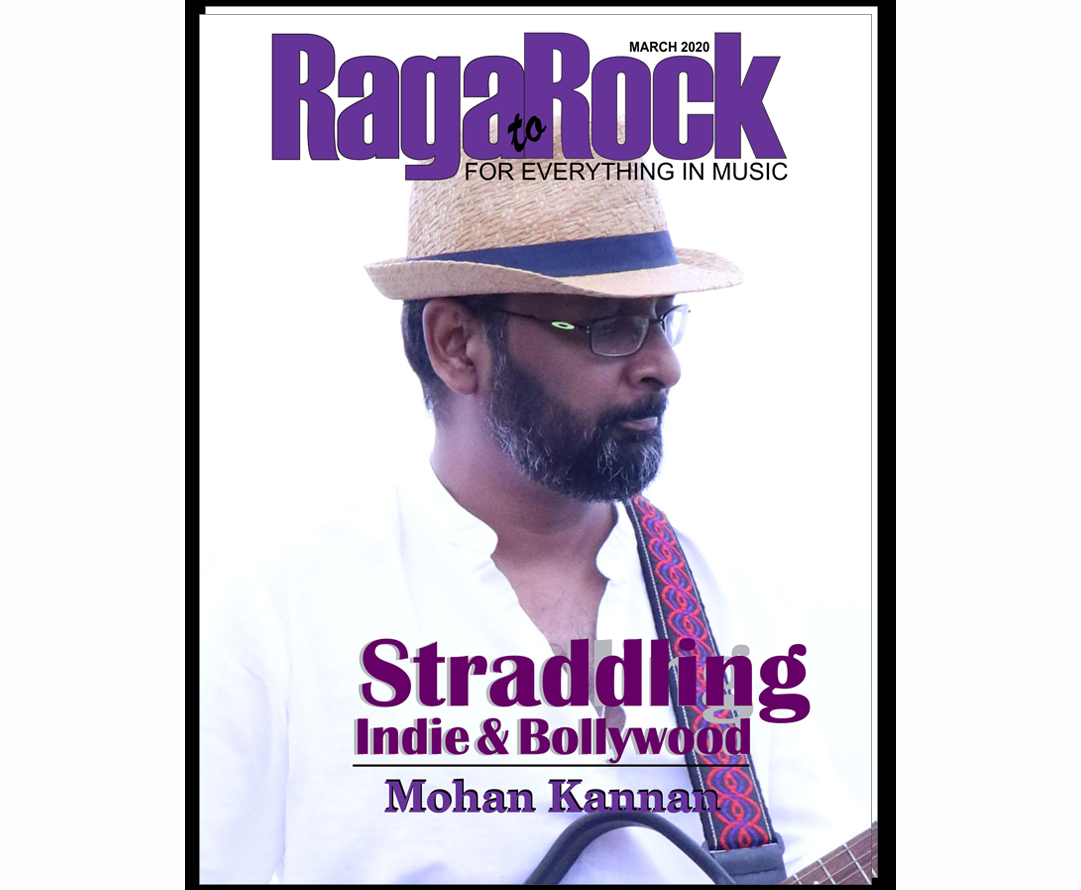
Straddling Indie and Bollywood - Mohan Kannan
Mohan Kannan is a name you will find on both sides of the Indie/Bollywood divide. A versatile musician, singer and composer, Mohan started off as the lead vocalist of one of India’s best known rock bands Agnee but he has a background steeped in classical music, as his mother is the well known Carnatic vocalist and violinist Vasantha Kannan. He is an accomplished mridangam player and has won the prestigious Palghat Mani Iyer award for the Best Mridangam Player three times.
Kannan’s entry into Bollywood came about when he was approached to sing ‘Khanabadosh’, a song composed by Shankar-Ehsaan-Loy for the 2009 film, London Dreams. Since then he has sung in several films and worked with some of the biggest names in Bollywood including Amit Trivedi, Abhishek Ray, Pritam to name a few.
Here Mohan Kannan speaks to RagatoRock about his musical journey and how he is at home with both Indie and Bollywood music.
What is the pressure you had to handle when you entered the Music Space given the success of your mother in Carnatic music?
The pressure of becoming a full time musician had everything to do with making it work as a profession and justifying it as a financially viable proposition actually. I remember telling people at work, “As a successful musician, I can make as much in a day as we do in a year”, just before I quit.
My mother’s knowledge and the teachings she passed on to me (and continues to do so) only helped in making me understand my own benchmarks for quality, and she is still the first person to listen to all my compositions and tell me what she honestly feels (and it’s not always a good comment J).
Do you go to her with your new songs or compositions for advice?
Ah, as I said, I do! I remember I had composed for Abida Parveen to sing (for a tv show that unfortunately never got made) and because I’m such a big fan of hers, I went overboard in trying to impress her. My mother heard the scratch and told me, “It’s the fault of Ragas...they’re too limited for someone as talented as you to express yourself well with just one. No wonder you had to go to so many different ragas to make this song”. I remember getting off the phone and immediately deleting the composition. The next one I composed was a lot more honest to the song itself and to the meaning I had to convey. I never played the first one to anyone else.
What is Mohan Kannan's trick to look effortless on stage?
Being effortless sometimes just happens (when it’s a good day on stage), but that is not as often as the days when it’s a little bit of spontaneity and a little bit of practiced performance. After my third show with Agnee in 2007, I realised I was worrying too much about the way my performances “looked” or “sounded” and was allowing that worry to mould the way I behaved. I was trying too hard to be a “rockstar” and my music was suffering. My friend, Priya, pointed this out to me after a show, thank God. I then started behaving as I normally do, and started enjoying the music and reacting to it on stage like I would in my living room. And I’ve realised that honesty always works and music is such a powerful medium that audiences will get drawn in to an honest effort much more than to a convoluted effort to try and impress them.
You have been performing on stage with Agnee for years? What made you jump into Bollywood Live Shows? Should we be expecting new collaborations for these performances?
It’s been over 12 years that we’ve launched Agnee and we’ve performed many shows across India. We’ve grown to learn that we are called to perform our songs like, Aahatein or Sadho Re or Kabira or Manmaani etc and no one expects us to (or wants us to) perform Bollywood for them. And we wouldn’t have it any other way for Agnee.
However, in these last twelve years, I’ve also sung over 50 songs in Bollywood and would love to showcase those live too. Koco and I realised that these songs don’t necessarily fit in the Agnee brand of sound, and so we decided to set up a different act for my Bollywood songs. There will be a few collaborations on stage for sure, we already have a much larger team for this act that we call “Mohan Kannan Live”, and this will also be the platform for a lot of my solo compositions to be performed live once they’re released.
How do you describe the Mohan Kannan Live shows to be different from the current Bollywood shows?
I hope to bring a holistic experience with audio, video, lights and performances on stage, so that everyone gets a larger than life (or, as I like to call it, “Larger Than Live”) experience and every show leaves them wanting to come for the next one.
Any tips for budding artists as to how to perform effortlessly on stage?
Just what I learnt myself… Be as honest as you possibly can.
How did Wahi Hain Raaste come about?
Shirin, who is a rockstar and works with Shankar Ehsaan Loy, called me one day and asked me to come record the song. Once I went to the studio, I learnt it was for Panga. The song is a beautiful composition, and as is the case with every one of their compositions, so rich in melodic content. I was super happy to sing it. I had to go back to record a few parts again for pronunciation, and that’s when I met Javed Akhtar Saab for the first time. It was a pleasure working with such stalwarts as Shankar Mahadevan and Javed Akhtar and a wonderful learning experience...I hope people love the song in my voice as much as I loved listening to it in Shankar’s voice!
- Stanley Paul

Making her "Break Through”.
Kashmira Khot recently released her debut single “Break Through”. It’s a mixture of pop, grunge and rock vibes. This song is about changing your vision and dreams, being afraid of it, worrying about the pain it causes, and yet again, asking someone to wait on these fears,while you face these changes for good. R2R gets to know about the artist and her music better

